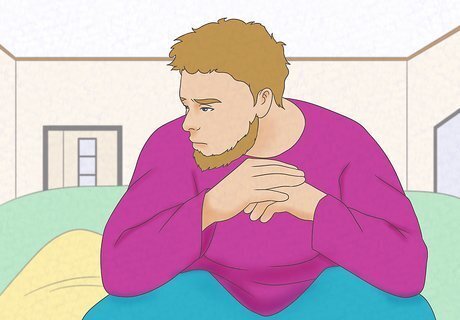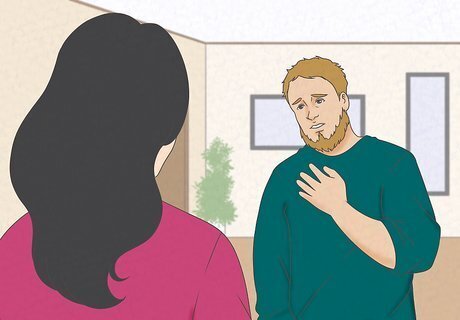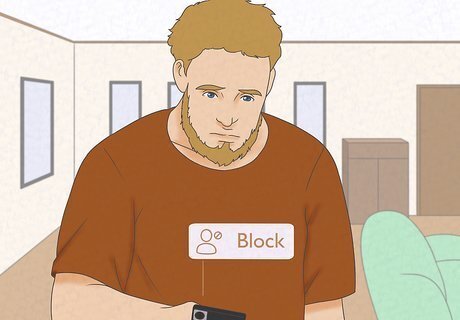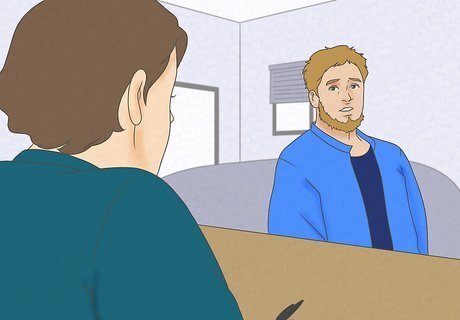
views
- Take responsibility for your actions, but acknowledge that there’s a reason why you cheated.
- Ask yourself “Why?” and “How?” to fully accept and move on from your actions.
- Be empathetic toward yourself and your partner because cheating hurts both parties.
Acknowledge and accept that you cheated.

To forgive yourself, you must take ownership of your actions. Every choice has consequences, and sometimes those consequences aren’t easy. Take accountability for your actions, and know that it’s okay to want to feel better. You can take the first steps toward self-forgiveness even if you cheated. Accept your mistakes and vow to continue learning from them by understanding that you did something wrong.
Ask yourself why you cheated.

Understanding your motivations can help you resolve internal and external conflicts. Something led you to cheat on your partner. Maybe you’re unhappy in the relationship, feel stagnant, or have feelings for someone else. Discovering the reason behind your actions may just help you learn more about yourself. Try answering these questions: Does the relationship feel right? Do you often compare your relationship with other people’s? Are you emotionally and physically fulfilled by your partner? What do you want in life and a relationship? What do you feel tempted by? Do you imagine yourself with someone else? How confident are you in yourself?
Take time to work through your feelings.

Analyzing yourself can help you become more self-aware. How did cheating make you feel? What emotions come up when questioning your relationship and faithfulness? Working through your emotions and self-reflecting can help you clear up internalized confusions and discomforts. Forgiveness is a part of self-growth, and you can’t grow without looking deeper into yourself. Consider writing your thoughts in a journal to help you process your feelings. Try meditating to improve your emotional state and understand your emotions.
Consider telling your partner you cheated.

If you haven’t done so already, try being honest about what happened. Admitting that you cheated can help ease your guilt and lift the burden of lying. Sit down and talk to your partner face-to-face. Communicate openly and honestly about your unfaithfulness, and avoid shifting the blame to them by using “I” statements. Sincerely apologize for what you’ve done, and ask them how they would like to move forward. Forgiveness takes time, and know that your partner isn’t obligated to forgive you even if you’ve apologized. Respect their feelings, space, and final decision (even if that means ending the relationship). If you don’t feel comfortable sharing the truth with your partner just yet, that’s okay! Do whatever you think is best for you and your relationship.
Think about yourself in a positive light.

Punishing yourself won’t make you feel less guilty. Self-hate can leave you feeling stuck and prevent you from making positive changes to move on. Instead of putting yourself down, try to lift yourself up. Remind yourself why you cheated, reiterate that you won’t let it happen again, and be kind to yourself. Replace negative self-directed thoughts and feelings with positive, respectful, and compassionate ones. For instance, instead of thinking, “I’m an awful person for cheating,” you can say, “I’m human and I make mistakes, but I’m going to learn from them.” Cheating may end your relationship, but it doesn’t define who you are. Take each day one step at a time, learning and growing from each past mistake.
Take steps to avoid cheating.

Push aside temptations to stop yourself from cheating in the future. If you don’t want to be in this situation again, you need to do something about it. You’ve addressed why you wanted to cheat, and now it’s time to find ways to control your temptations. Cut ties with the person you cheated with, avoid a specific store or area, delete social media, and/or set yourself a curfew each night. Actions speak louder than words, and demonstrating your trust by never cheating again says more than a loose promise.
Keep moving forward.

Forgive yourself by continuing to live your life. It’s possible to be happy in and out of a relationship. Although it’s necessary to acknowledge and learn from your mistakes, you don’t have to dwell on them. Your past mistakes don’t have to define you, as long as you do the work to right them. Remember, healing and self-forgiveness take time. Be gentle with yourself and envision your life positively.
Seek professional help if you’re still struggling.

Sometimes, you need a little extra help to work through your emotions. Reach out to a therapist or marriage counselor to discuss your unfaithfulness, as they’ll be able to help guide you towards forgiveness. Consider asking your partner to attend therapy or counseling with you, especially if you’re both working on mending the relationship. Online services like BetterHelp and TalkSpace offer virtual individual and couple’s counseling. Reader Poll: We asked 306 wikiHow readers what they would do if their partner was cheating over text, and only 7% said they would forgive them and try to work through it. [Take Poll] So, if that doesn’t work, try therapy for additional support.




















Comments
0 comment